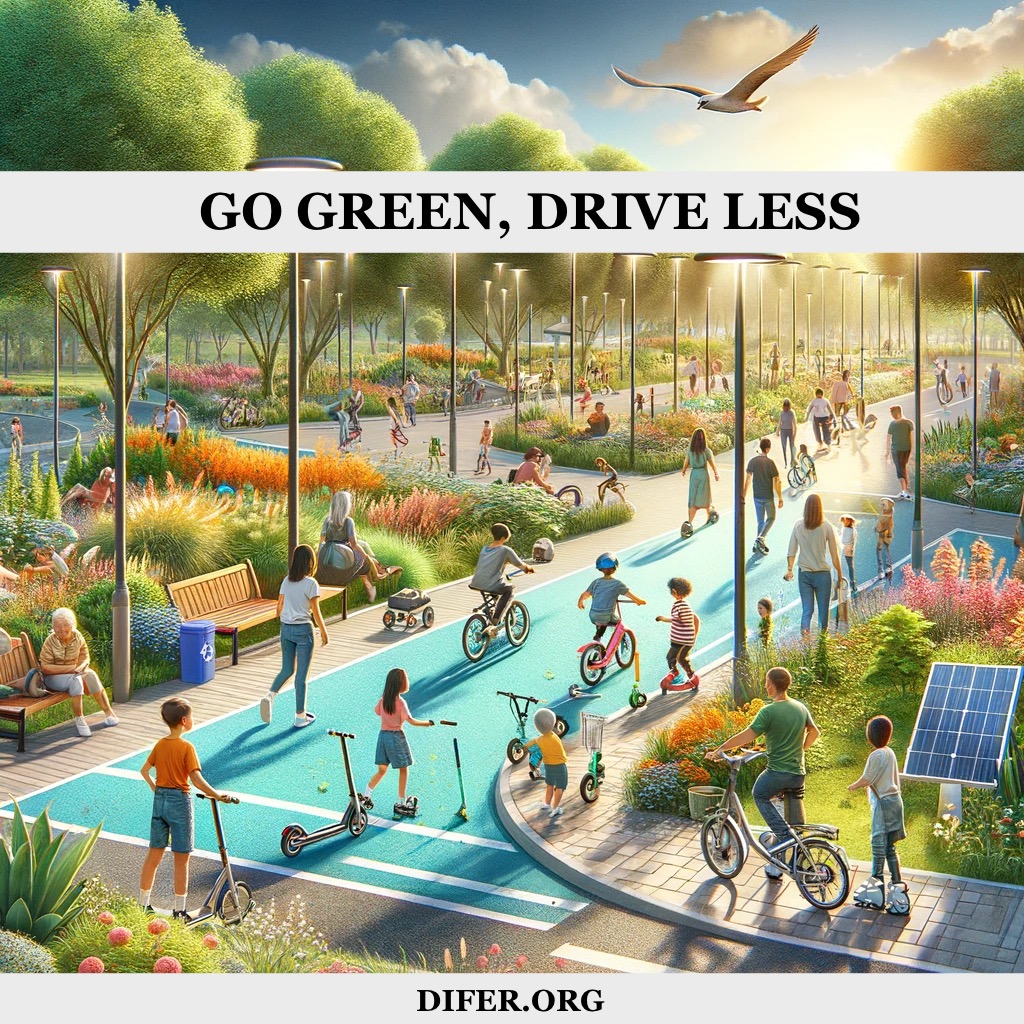Driving less has many environmental benefits and will help the well-being of the planet. Here are some key reasons why reducing car usage is environmentally beneficial:
- Reduced Greenhouse Gas Emissions: The combustion of fossil fuels in vehicles, such as gasoline and diesel, releases carbon dioxide (CO2) and other greenhouse gases into the atmosphere. These gases contribute to climate change by trapping heat, leading to global warming. Driving less or using alternative transportation methods helps decrease the overall emissions of greenhouse gases, mitigating the impact on the climate.
- Air Quality Improvement: Vehicles emit not only greenhouse gases but also pollutants that can harm air quality. Nitrogen oxides (NOx), particulate matter, and volatile organic compounds (VOCs) are among the pollutants released from car exhaust. Reducing the number of vehicles on the road decreases the concentration of these pollutants, leading to better air quality and lower health risks for humans and ecosystems.
- Conservation of Natural Resources: The production and consumption of fossil fuels for transportation purposes contribute to the depletion of finite natural resources. By driving less, you reduce the demand for these resources, promoting conservation and sustainability.
- Preservation of Ecosystems: Roads and highways can fragment and disrupt natural habitats, leading to habitat loss and fragmentation. Reduced driving means less road construction and maintenance, helping to preserve ecosystems, protect wildlife, and maintain biodiversity.
- Noise Pollution Reduction: Vehicle traffic is a significant source of noise pollution, which can negatively impact both human and animal well-being. By driving less, especially in densely populated areas, you contribute to a quieter and more peaceful environment.
- Energy Conservation: The production and transportation of fuel require energy, often derived from fossil fuels. Driving less reduces the overall demand for energy, contributing to energy conservation and potentially encouraging the use of cleaner, renewable energy sources.
- Reduced Traffic Congestion: Less driving can lead to reduced traffic congestion, improving the overall efficiency of transportation systems. This can lead to smoother traffic flow, decreased fuel consumption, and fewer emissions per vehicle mile traveled.
Encouraging alternative modes of transportation, such as walking, cycling, using public transit, or carpooling, can further amplify the environmental benefits of driving less. Also, the adoption of electric vehicles and other low-emission technologies can help mitigate the environmental impact of personal transportation.
Reducing your driving can be a positive step toward minimizing your environmental impact. Here are some practical tips to help you drive less:
- Use Public Transportation: Opt for buses, trains, trams, or subways for your daily commute or other travel needs. Public transportation is more energy-efficient and helps reduce the overall number of individual vehicles on the road.
- Carpooling: Share rides with friends, family, or coworkers. Carpooling not only reduces the number of vehicles on the road but also helps save money and reduces your carbon footprint.
- Walking and Cycling: For short distances, consider walking or cycling instead of driving. It’s not only environmentally friendly but also promotes personal health and well-being.
- Telecommuting: If your job allows, inquire about the possibility of working from home part-time. Telecommuting reduces the need for daily commuting, cutting down on fuel consumption and emissions.
- Combine Errands: Plan your trips efficiently by combining errands into one outing. This reduces the number of separate trips and helps optimize fuel efficiency.
- Car Sharing: Consider using car-sharing services or renting a vehicle when needed instead of owning a car. This can be a cost-effective and environmentally friendly alternative, especially if you don’t require a vehicle regularly.
- Electric and Hybrid Vehicles: When the time comes to get a different vehicle, invest in an electric or hybrid vehicle. These vehicles produce fewer emissions and contribute to lower air pollution.
- Maintain Your Vehicle: Regular maintenance, such as keeping your car in good condition and ensuring proper tire inflation, can improve fuel efficiency. A well-maintained vehicle is more environmentally friendly.
- Flexible Work Hours: If your job allows flexibility, consider adjusting your work hours to avoid peak traffic times. This can lead to smoother traffic flow and reduced congestion.
- Ride-Sharing Apps: Use ride-sharing apps to connect with others heading in the same direction. Apps like UberPool or Lyft Line allow you to share rides with other passengers, reducing the overall number of vehicles on the road.
- Educate and Advocate: Spread awareness about the environmental benefits of driving less among your friends, family, and community. Encourage others to adopt sustainable transportation practices.
Every small effort counts, and collectively, these actions can contribute to a more sustainable and eco-friendly transportation system.
DIFER.ORG is Committed to Reducing Waste





Pingback: Save Green By Driving Less – DIFER.ORG